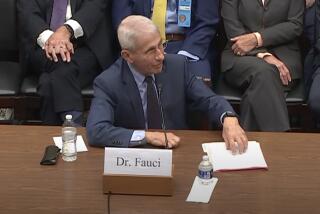Panel Members Scold Poindexter : Admiral Ends Testimony Amid Charges of Secrecy, ‘Disarray’
WASHINGTON — Former National Security Adviser John M. Poindexter, who by his own account unilaterally decided to divert Iranian arms sale profits to Nicaragua’s contras , was condemned by members of the congressional investigating committees Tuesday for creating “disarray in the Oval Office” and cutting President Reagan out of the decision-making process.
As he concluded five arduous days of testimony, Poindexter was forced to listen to a succession of committee members portray him as a man obsessed by secrecy, contemptuous of the normal processes of government and insensitive to the special prerogatives of the presidency.
Locked Out of Process
“You locked the President himself out of the process . . . “ said Rep. Lee H. Hamilton (D-Ind.), chairman of the House investigating panel. “Secrecy contributed to disarray in the Oval Office. The President apparently did not know you were making some of the most important decisions of his presidency.”
Undaunted by the scolding, Poindexter insisted that a majority of Americans support the efforts he made to provide secret assistance to the contras. Moreover, he asserted that the hearings, although widely viewed as a serious political setback for the President, had actually increased public acceptance of Reagan’s policy in Central America.
“The people understand; they are getting the message,” he said, citing thousands of telegrams he has received since he began testifying last Wednesday. “They are supportive of the actions that I have taken and the President has taken, and they’re appreciative. . . . They are beginning to understand the policy.”
The defiant 50-year-old rear admiral later concluded his appearance by declaring: “I leave this hearing with my head held high that I have done my very best to promote the long-term national security interests of the United States.”
Although Poindexter’s testimony left many unanswered questions, he apparently settled the central question of the President’s role. Since he disclosed last Wednesday that Reagan knew nothing about the diversion of Iran arms sale profits to the contras, committee members of both parties have expressed a growing desire to bring their lengthy inquiry to a rapid close.
“The hearings have changed dramatically since last week,” said Rep. Jim Courter (R-N.J.). “The important questions have been answered. . . . We now go on to other things.”
Final Authority
Even those who suspect that Poindexter was not telling the truth appeared willing to accept him as the final authority.
“As the King of Siam said, ‘It’s a puzzle to me,’ ” remarked Senate Committee Chairman Daniel K. Inouye (D-Hawaii). “Who should I believe? . . . The jigsaw puzzle will not be complete.”
Outside the hearing room, Inouye said that Poindexter’s decision to leave the President uninformed was at the heart of his inability to convince all committee members that he had told them the truth.
“He has made it very clear that he withheld information from the President,” said Inouye. “ . . . And therefore there is this gnawing question that all of us have: ‘Is he withholding any information from us at this moment?’ ”
Inouye said that the hearings, now in their 10th week, will conclude within two weeks after testimony by at least four more witnesses: Secretary of State George P. Shultz, Atty. Gen. Edwin Meese III, Defense Secretary Caspar W. Weinberger and former White House Chief of Staff Donald T. Regan. After taking today off, the committees are scheduled to hear from Shultz on Thursday and Friday.
It was inevitable that Poindexter, who took sole responsibility for the most important aspect of the Iran-contra affair, also would take the brunt of criticism from Congress. In general, however, his critics seemed to accept the truth of his contention that he deprived the President of any opportunity to approve or disapprove the diversion of funds.
Documents Destroyed
Hamilton excoriated Poindexter not only for failing to tell Reagan about the diversion but also for destroying key documents, for withholding information from Congress and for cutting other agencies of government out of the policy-making process.
He said that Poindexter compounded these errors by withholding information from the President after the Iran-contra affair became public, causing Reagan to make many false statements that undermined his credibility.
“Because he lacked information, the President inflicted serious and repeated political wounds upon himself,” Hamilton said.
He added: “If the President did not know what you did, he should have known.”
Conservative Joins In
Likewise, Rep. Michael DeWine (R-Ohio), a conservative frequently at odds with Democrats such as Hamilton, criticized Poindexter for withholding information from Reagan.
“You came in here and you said, ‘The buck stops with me,’ ” DeWine said. “I appreciate that; I understand that. But the sad truth is that in this country, the buck can only stop one place, and that’s the Oval Office. That sign originally was in Harry Truman’s office, not on his national security adviser’s desk.
“I think in essence you took the key player, the best player, out of the game. The premier politician of this generation, Ronald Reagan, did not have the opportunity to have the essential facts to make what in essence was a political judgment.”
House Majority Leader Thomas S. Foley (D-Wash.) said that Poindexter, who directed the staff of the White House National Security Council, apparently resorted to extreme secrecy because he mistrusted Congress, the bureaucracy, the press and even the President’s own Cabinet--all the institutions that normally shape public policy.
“If the view that you have . . . is that the National Security Council is surrounded by a media that often deliberately distorts and deliberately misreports on the news and events, that the Congress is reflecting attitudes that are in bad faith in the attempt to confront the President’s policies, that the normal agencies of government are lacking in enthusiasm and sort of affected by a cancer, a bureaucratic unwillingness to take risks, that leaves a very small group of people . . . to whom you would feel comfortable sharing your plans and proposal for presidential action,” Foley said.
Reads Letter
In his own defense, Poindexter referred to the thousands of letters and telegrams he has received from American citizens since he began testifying--most of them affirmative. Citing these communications as proof that “a majority of Americans” support his views, he read one that he characterized as representative of them all.
Written by a woman in Conyers, Ga., the letter castigated the news media for misrepresenting the Iran-contra hearings, expressed support for the Nicaraguan resistance and lauded Poindexter for his actions on their behalf.
“For the first time,” the writer said, referring to Poindexter’s testimony, “I knew what was at stake in Nicaragua and who the contras are.”
Cabinet Officers’ Role
As the committees prepared to turn their attention to the role that Shultz, Meese and Weinberger played in the affair, many members began asking how Poindexter could have succeeded in usurping the normal role of Cabinet officers.
Poindexter testified that Shultz, after losing his battle to dissuade Reagan from selling arms to Iran, chose to back away from what proved to be one of the Administration’s most significant and politically explosive foreign policy initiatives. In fact, he said, Shultz even asked not to be informed about the details of the program after that.
“The sad fact is that the secretary of state chose to protect his own position,” concluded DeWine.
“You could draw that conclusion,” Poindexter agreed.
‘Most Interesting’
Inouye said that Meese is likely to prove the “most interesting” of the remaining witnesses. The attorney general has come under harsh criticism for the highly informal manner in which he handled an internal inquiry into the scandal last November.
Although Meese was involved in the development of the Iran arms sale policy, he has said that he did not remember last November that the President had approved two Israeli shipments of arms to Iran in late 1985.
Poindexter said he had no hard evidence that Meese knew before last November about the President’s support for the 1985 shipments. But he added that the attorney general was present at a meeting in January, 1986, in which the matter almost surely was discussed.
“Although I can’t recall specifically the conversation, I find it difficult to believe that we didn’t get off on a discussion of the 1985 shipments,” he said.
Committee members continued to press Poindexter for his recollections of what he discussed with the late CIA Director William J. Casey during a luncheon meeting on Nov. 22, the same day that Justice Department investigators discovered the diversion.
For a second day, Poindexter assured the panel that he and Casey had not discussed the diversion, but his account of that session changed somewhat.
On Monday, he said that the conversation centered on how “to get over to the American people better” the Administration’s reasons for the Iran initiative. On Tuesday, he said it involved Casey’s earlier testimony before Congress and may also have touched on an internal Administration dispute over whether Reagan had approved the 1985 shipments.
Sen. Sam Nunn (D-Ga.) expressed disbelief that Poindexter had no better memory of the crucial meeting. “This was an enormously important meeting with you and Director Casey,” he said, “and yet you seem to not recall anything about it except that you had sandwiches.”
More to Read
Get the L.A. Times Politics newsletter
Deeply reported insights into legislation, politics and policy from Sacramento, Washington and beyond. In your inbox three times per week.
You may occasionally receive promotional content from the Los Angeles Times.










